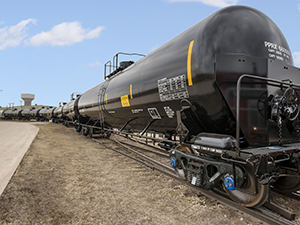County supervisors deny modification to refinery rail spur
 –On Tuesday, on a 3-1 vote, the San Luis Obispo County Board of Supervisors upheld the Planning Commission’s denial of a Development Plan/Coastal Development Permit to allow for construction of the Phillips 66 Rail Spur at the Santa Maria Refinery.
–On Tuesday, on a 3-1 vote, the San Luis Obispo County Board of Supervisors upheld the Planning Commission’s denial of a Development Plan/Coastal Development Permit to allow for construction of the Phillips 66 Rail Spur at the Santa Maria Refinery.
In addressing the public, 5th District Supervisor Arnold stated, “I share your concerns for the health and safety of our citizens. Neither profits for the oil companies, tax revenues for the county, or jobs are discussed in my comments because those were not issues that influenced my decision.”
“My primary concerns were 1) public safety; and 2) the economic well-being of my constituents as it is influenced by higher gasoline and diesel prices. As a decision-making body, seldom do we make decisions that could affect the affordability of fuel, but this one could,” said Supervisor Debbie Arnold. “Phillips 66 is only in business because we voluntarily buy their product. Californians buy over 15 billion gallons of gas and diesel annually. In 2015, California had over 25 million licensed drivers.”
“I disagree with my colleagues that we should outright deny this project. In arguably the tightest regulatory climate in the nation – we can make the findings to approve this project with conditions that mitigate many of the concerns we’ve heard.”
”The thing we can’t mitigate is the movement of crude oil and other flammable materials on the mainline tracks. Neither can Phillips 66. Trains will continue to move through our County with or without this project. I will be lobbying federal representatives myself to address rail safety and railroad infrastructure,” said Arnold.
“What we are being asked to permit today is ‘modification of an existing on-site rail spur’ at an existing refinery. What we didn’t hear much about are the consequences of denying the project,” Supervisor Arnold stated. With no train deliveries and the pipeline down, that leaves two options: 1) less production at the refinery – these kinds of policy decisions have the potential of driving prices up at the gas pump. Higher gas prices affect us all, but especially hurt working class and low-income households; and 2) delivery by truck. “My fear is that the decision today puts more trucks hauling flammable materials on our roads… on our already crumbling roads, with our distracted drivers, creating a higher risk for accidents than train transport would.”
The denial of this project will prohibit Phillips 66 from receiving their request of 3 crude oil trains per week. That equates to putting approximately 1,000 trucks per week on the road to deliver the same amount of crude oil.









